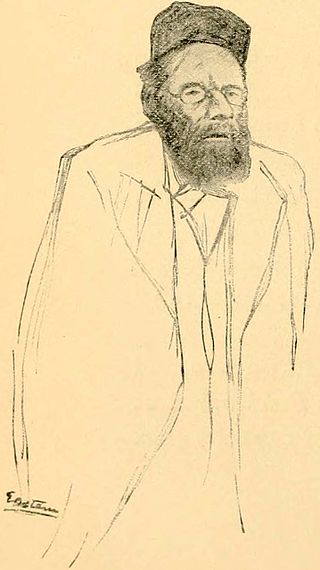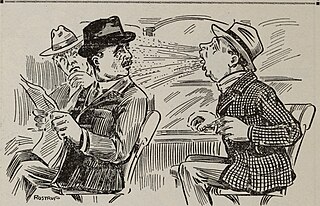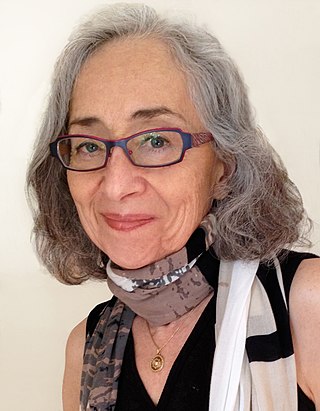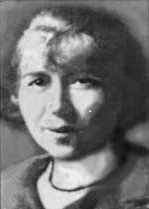Gitl Schaechter-Viswanath (born 1958) is a Yiddish-language poet and author.
Gitl Schaechter-Viswanath (born 1958) is a Yiddish-language poet and author.
Gitl Schaechter was born in The Bronx New York. She grew up in a Yiddish-speaking home and attended Yiddish schools as a child. She attended school at the Sholem Aleichem Folkshul 21 and has degrees from Barnard College in Russian, Columbia University in nursing, and New York University in health administration. She also has a teaching diploma from the Jewish Teachers Seminary.[ citation needed ]
She began writing poetry, much of which was published in the journals Yugntruf and Afn Shvel, in 1980. Several poems were published in English and Yiddish in Hadassah magazine, the literary journal Five Fingers Review, and various anthologies. While her poems range widely in subject matter, her lyric technique is remarkably consistent. She tends towards short poems of no more than two pages, exploring single incidents or observations fully but using highly compressed language. She uses rhyme in many but not all poems, and varies rhyme scheme within a poem when necessary. She uses a variety of meter as well as unmetered verse. While her technique produces poems of unusual intensity, they are leavened with playfulness and puns. Her subject matter includes big questions such as marriage and grief; and small questions such as baking a failed loaf of bread. A poem about the day following the September 11, 2001 attacks is eerily still.
Her 2003 book Plutsemdiker Regn/Sudden Rain is a bilingual edition of about 40 of her poems in Yiddish and English. Although Schaechter-Viswanath is a native speaker of both languages, she does not write poetry in English and does not translate her own Yiddish works into English. Her translators are Zackary Sholem Berger, himself a poet in both English and Yiddish, and Jeffrey Shandler, associate professor of Jewish Studies at Rutgers University and a well-known translator. The magazine Hadassah called her poems "introspective and witty," and the book was hailed as "that rarest of miracles: a first book of poetry in which every poem is a gem" by the Newsletter of the Association of Jewish Libraries .
In 2016, Indiana University Press published the Comprehensive English-Yiddish Dictionary, which was co-edited by Schaechter-Viswanath and Dr. Paul Glasser. [1] The dictionary, containing nearly 50,000 entries and 33,000 subentries, was the first of its kind in over half a century, [2] and carried on the lexicographical work and legacy of her father, Mordkhe Schaechter.
Schaechter-Viswanath's intellectual pursuits have been widely varied: she earned degrees in Jewish literature, Russian language, nursing and health administration. She works as a clinical consultant in health care and remains active in Yiddish cultural endeavors. She lives in Teaneck, New Jersey, with her husband and three children, and practices Orthodox Judaism. [3] Her children all speak Yiddish as well as their father's first language, Tamil. [4] She is a member of the Jewish People's Philharmonic Chorus, conducted by her brother. [5]
Schaechter-Viswanath is a member of a leading family in Yiddish language and cultural studies. Her father, Mordkhe Schaechter, was an influential linguist of the Yiddish language. Her aunt Beyle Schaechter-Gottesman is a poet and songwriter; sister Rukhl Schaechter is a journalist with the Yiddish Forward; sister Eydl Reznik [6] teaches Yiddish and directed a Yiddish chorus among the ultra-Orthodox community in Tsfat, Israel; and brother Binyumen Schaechter is a Yiddish composer and performer. Schaechter-Viswanath and her siblings all maintain Yiddish-speaking homes. In February, 2020, Schaechter-Viswanath's son, Arun “Arele” Schaechter Viswanath, had his Yiddish translation of Harry Potter and the Philosopher's Stone published. [7] Schaechter-Viswanath's daughter, Meena Viswanath, is one of the developers of the Yiddish course on Duolingo. [8]
Schaechter-Viswanath's husband, P. V. Viswanath, is a professor of Finance at Pace University's Lubin School of Business. He came to the United States from Mumbai for graduate school, became interested in Judaism, and met the then Ms. Schaechter at a Yiddishist retreat in the Catskills. [9]

Eliakum Zunser was a Lithuanian Jewish Yiddish-language poet, songwriter, and badchen who lived out the last part of his life in the U.S. A 1905 article in The New York Times lauded him as "the father of Yiddish poetry". About a quarter of his roughly 600 songs survive. He influenced and was influenced by Brody singer Velvel Zbarzher, although it is not believed that they ever met.

Yiddishism is a cultural and linguistic movement which began among Jews in Eastern Europe during the latter part of the 19th century. Some of the leading founders of this movement were Mendele Moykher-Sforim (1836–1917), I. L. Peretz (1852–1915), and Sholem Aleichem (1859–1916). The Yiddishist movement gained popularity alongside the growth of the Jewish Labor Bund and other Jewish political movements, particularly in the Russian Empire and United States. The movement also fluctuated throughout the 20th and 21st century because of the revival of the Hebrew language and the negative associations with the Yiddish language.

Yiddish literature encompasses all those belles-lettres written in Yiddish, the language of Ashkenazic Jewry which is related to Middle High German. The history of Yiddish, with its roots in central Europe and locus for centuries in Eastern Europe, is evident in its literature.

Jewish literature includes works written by Jews on Jewish themes, literary works written in Jewish languages on various themes, and literary works in any language written by Jewish writers. Ancient Jewish literature includes Biblical literature and rabbinic literature. Medieval Jewish literature includes not only rabbinic literature but also ethical literature, philosophical literature, mystical literature, various other forms of prose including history and fiction, and various forms of poetry of both religious and secular varieties. The production of Jewish literature has flowered with the modern emergence of secular Jewish culture. Modern Jewish literature has included Yiddish literature, Judeo-Tat literature, Ladino literature, Hebrew literature, and Jewish American literature.

Hester Street is a 1975 drama film based on Abraham Cahan's 1896 novella Yekl: A Tale of the New York Ghetto, and was adapted and directed by Joan Micklin Silver. The film stars Steven Keats and Carol Kane, who was nominated for an Academy Award for Best Actress for her performance.

Beyle "Beyltse" Schaechter-Gottesman was a Yiddish poet and songwriter.

Itsye Mordkhe Schaechter was a leading Yiddish linguist, writer, and educator who spent a lifetime studying, standardizing and teaching the language.
Binyumen Schaechter is a conductor, music director, composer, arranger, solo performer, and piano accompanist in the world of Yiddish music. He also lectures on topics related to Yiddish music, language, and culture. Many of his songs, choral arrangements, and performances are recorded on video, DVD, and CD. He is a composer in the world of American musical theater and cabaret, and his songs are performed in venues worldwide. He has been music director of The Yiddish Philharmonic Chorus since 1995.
The Schaechter-Gottesman family is a leading family in Yiddish language and cultural studies.

In English-speaking countries, the common verbal response to another person's sneeze is "[God] bless you", or, less commonly in the United States and Canada, "Gesundheit", the German word for health. There are several proposed bless-you origins for use in the context of sneezing.
Rajzel Żychlińsky was a Polish-born writer of poetry in Yiddish. She published seven collections over six decades. Her first two collections were published in Warsaw, Poland in 1936 and 1939, just prior to World War II. She survived the war by fleeing eastward to the Soviet Union, but many members of her immediate family were murdered in the Holocaust. Her postwar poetry, mostly written in the United States, was strongly influenced by these events.

Marcia Falk is a poet, liturgist, painter, and translator who has written several books of poetry and prayer.

Fradl Shtok was a Jewish-American Yiddish-language poet and writer, who immigrated to the United States from Galicia, Austria-Hungary, at the age of 18 or 19. She is known as one of the first Yiddish poets to use the sonnet form; and her stories, which were less well received than her poems in her lifetime, have since been recognized as innovative for their exploration of subjectivity, and, in particular, for their depiction of Jewish female characters at odds with traditional roles and expectations.
Rivka Basman Ben-Hayim was a Lithuanian-born Israeli Yiddish poet and educator. She was the recipient of the Itzik Manger Prize in 1984. Basman was also awarded the Chaim Zhitlowsky Prize in 1998.
Rukhl Schaechter is the editor of the Yiddish Forverts, one of the two remaining Yiddish newspapers outside the Hasidic Jewish world. She is the first woman, the first person born in the United States, and likely the first Sabbath observant Jew to hold that position.
The Itzik Manger Prize for outstanding contributions to Yiddish literature was established in 1968, shortly before Itzik Manger's death in 1969. Manger "was and remains one of the best-known twentieth-century Yiddish poets." The Prize has been described as the "most prestigious in Yiddish letters". Apparently no Manger Prizes have been awarded after 1999.
The League for Yiddish is a global, non-profit membership organization that promotes and encourages the active use of the Yiddish language in all areas of daily life. It is a charity with 501(c)(3) tax-exempt status, incorporated in the State of New York, U.S. The members of its board of directors and its staff live in the United States, Canada, and Israel. The League for Yiddish is one of the few secular Jewish organizations in the world that carries out nearly all its activities – from public events to staff meetings – in Yiddish.
Kathryn Ann Hellerstein is an American academic and scholar of Yiddish-language poetry, translation, and Jewish American literature. Specializing in Yiddish, she is currently a professor of Germanic Languages and Literatures and the Ruth Meltzer Director of the Jewish Studies Program at the University of Pennsylvania. She is known for her research focus on Yiddish women writers, notably Kadya Molodowsky, Malka Heifetz Tussman, and Celia Dropkin.

Manya Hirshbeyn, known primarily as Miriam Ulinover or MiryemUlinover, was a Yiddish-language poet. She is regarded for her folkloristic style and for being one of few religious and Orthodox Jewish women poets of her time.